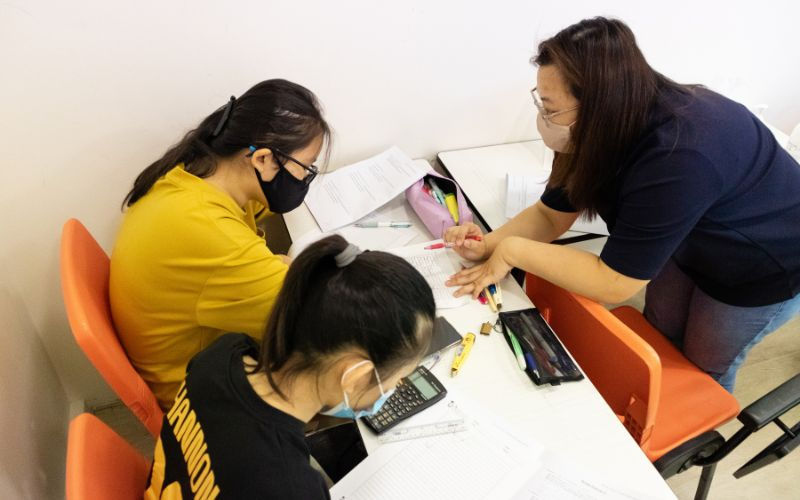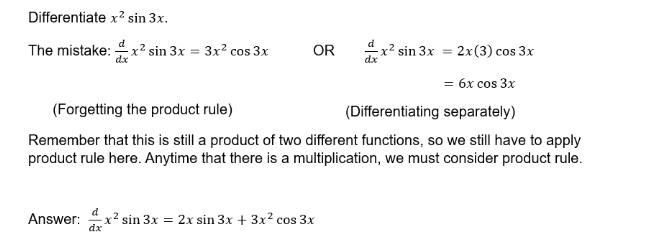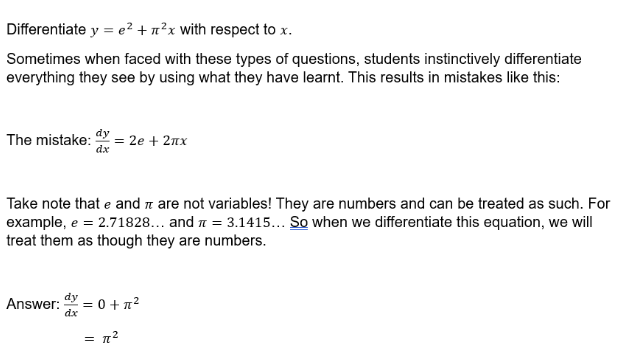4 Common Differentiation Math Mistakes That Can Lose You Marks
- AGrader Learning Centre
- Apr 28, 2025
- 4 min read

Differentiation is one of the most significant topics in Additional Mathematics (A-Math) and is heavily tested in the O-Level examination. As a cornerstone of calculus, differentiation maths rules are foundational for understanding rates of change and motion—concepts which appear in both pure and applied mathematics.
However, differentiation math problems can quickly become stumbling blocks if students aren’t careful. Because of the topic’s many steps and formulae, it’s all too easy to make small, careless errors that lead to losing valuable marks. The good news? These mistakes are predictable and, more importantly, avoidable.
In this article, we’ll explore four common differentiation math mistakes that can trip up even the most prepared student. More importantly, we’ll show you how to spot them, avoid them, and ultimately ace your exams with confidence.
Table of Contents:
1. Failure to Manage Negative Exponents
Negative exponents often lead to confusion. It’s a minor twist in the rules, but when misapplied, it can drastically alter the differentiation math solution.
Having a negative exponent sometimes throws students off, and students tend to forget to handle the negative exponent properly. Here is an example:

To avoid this, always write down the rule before applying it, especially when dealing with negative or fractional exponents. Take your time to avoid flipping the sign or making arithmetic errors.
Tip: Practise rewriting all functions with negative exponents in exponential form first. Don’t rush to apply the rule—check that you’re working with the correct base and exponent.


2. Forgetting to Fully Differentiate When Applying the Chain Rule
The chain rule is a powerful tool in differentiation math, but only if applied correctly. It is essential when you have a function within a function, commonly seen with trigonometric, exponential, and logarithmic expressions.
Common Error: A student might only differentiate the outer function and write:

To prevent this, always pause and identify the inner and outer functions when using the chain rule. Label them if necessary. Repeated practice with composite functions will make the process second nature.

3. Forgetting to Apply the Product Rule When Dealing with Trigonometric Functions
Sometimes when students face a trigonometric function with multiplication, they might make two different careless mistakes. They might forget to apply product rules or even differentiate the functions separately

4. Mistaking Constants Like π and e for Variables
This one is subtle but surprisingly common. In differentiation math, understanding what counts as a constant versus a variable is essential.
Mathematical symbols like π (pi) and e (Euler’s number, ≈2.718) are constants—their values do not change. Therefore, their derivatives are treated differently.

Misidentifying e as a variable might lead students to differentiate it unnecessarily or replace it with an incorrect function.
Tip: Commit the identities of common mathematical constants to memory. Keep a mental list: π, e, and numerical values like 2, 3, ½—all are constants. Treat them as such.
Wrapping Up: Practice, Precision, and Patience
Differentiation is not just about plugging into formulae. It requires:
Careful observation of the type of function
Correct use of differentiation maths rules
Clear understanding of differential definition math concepts
Every mistake we’ve outlined stems from a momentary lapse and is easily avoidable with regular practice and attention to detail.
Bonus Tip: Work Through Differentiation Problems Aloud
Verbalising your steps, even just whispering to yourself, can help reinforce logic and catch errors before they happen. It might sound odd at first, but it's a technique used by top-performing students (and mathematicians!).
So next time you sit down to tackle differentiation math problems, take a breath, remember the rules, and work through each step with care. You're not just learning to solve problems—you're training your brain to think like a mathematician.

Parents of Secondary students looking to strengthen their child’s performance in Mathematics should consider enrolling them in AGrader Tuition Centre’s Secondary Math Tuition programme, which covers both E-Math and A-Math. Every weekly lesson is carefully curated to align with the latest MOE syllabus and is strategically taught ahead of the school curriculum to give students a solid academic head start. Lessons are paired with high-quality, in-house worksheets that reinforce learning and build confidence in tackling exam-style questions.
More than just weekly tuition, AGrader provides exceptional value with free access to EverLoop Modules—an exclusive after-class learning system that allows students to revise and relearn content from up to three previous academic levels, helping them close gaps and strengthen fundamentals without any additional or hidden fees. With dedicated and experienced teachers supporting your child every step of the way, AGrader offers the ideal environment for mastering Secondary Math and excelling in the O-Levels.
Join Our AGrader Community Today! (Free for all AGrader & Non-AGrader students)
Join our Telegram and WhatsApp channels to gain access to more study tips, free downloads, and much more for all subjects.
- WhatsApp channel: https://bit.ly/agwachannel
- Telegram channel: https://bit.ly/agtelchannel
Feel free to explore more related topics in this section:
Unlocking the Power of Real-World Math: Real World Applications Questions for Secondary 1 and 2 Math
Secondary 3 Math: Top 3 Common Mistakes & Questions in Congruence and Similarity
4 Most Commonly Tested Types of Secondary Math Questions in Algebraic Fractions & Formulae
5 Common Questions on Secondary Math's 'Approximation and Estimation' Topic and How To Score Them
5 Common Mistakes in Secondary Math Linear Equations Problems and How to Avoid Them
2 Methods To Solve Tricky Simultaneous Equations Questions in Secondary Mathematics
Tough Secondary 1 Maths Topics and How to Prepare Your Child




Comments